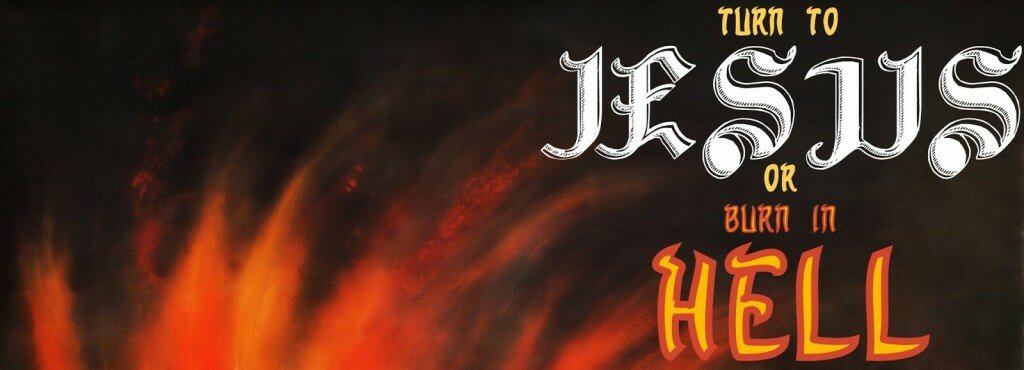As I continue responding to the discussions on my post about Ricky Gervais, I now come to the second of three challenges I made to Christians (first here). It’s to do with the message we have to offer.
I said we often begin explaining our faith with “You’re going to hell”, before carrying on with “but…” and then explaining they don’t have to if they’ll sign on the dotted line. To quote myself:
It seems there is a two-step ‘evangelism’ method being practised far too often. Step 1: tell someone God is angry enough with them to send them to hell. Step 2: tell them God loves them enough to let them into heaven after all.
Hell is not good news
I’m laying my cards on the table: I don’t believe this is good news. It’s bad news, then a remedy for bad news. My main problem is that it uses fear as a tactic, not love. It even has a slogan: ‘Turn or burn’.

I believe there’s a better way. When the book of Acts talks of the early believers telling people the good news, I believe it means just that – they had good news to offer. They didn’t have a “You’re going to hell, but…” gospel.
That’s my real beef with this presentation of the Christian faith. Not just that it isn’t good news, but it isn’t the good news. It is not the gospel. It just isn’t. The gospel is far bigger and more wonderful than “You’re going to hell, but…”
How about something like this, instead…?
Restoration is good news
Christianity doesn’t start with us, it starts with God. God is brilliant. He’s perfect, He’s good and in His very being He is love. In fact He has so much love He couldn’t keep it to Himself. The whole created world is an overflow of His love, His desire for relationship.
God’s perfect world was defined by love, and people were the pinnacle, the high point, the part of creation into which God poured His very being. We were companions of God, made to love Him, be loved by Him, love and care for each other, love and care for the world around us.
Love isn’t love unless it’s a choice. Forced love isn’t love at all. So God gives us that choice, and since the dawn of time people have chosen not to live their lives directed towards love of God or each other. The world was meant for love, and without it became broken. The ripple effects of that brokenness affect all relationships: with God, each other, and the world. We see that brokenness every day. But here’s the good news.
 Ever since, God’s been in the work of restoration. He’s continued to pour out His love. Instead of staying far from us, leaving us broken, He entered in. He rubbed shoulders with us in the person of His Son, Jesus, who showed us what God is really like, and what it means to be truly human. He died, and as He did all the brokenness of the world was placed on His shoulders, dealt with there, once and for all.
Ever since, God’s been in the work of restoration. He’s continued to pour out His love. Instead of staying far from us, leaving us broken, He entered in. He rubbed shoulders with us in the person of His Son, Jesus, who showed us what God is really like, and what it means to be truly human. He died, and as He did all the brokenness of the world was placed on His shoulders, dealt with there, once and for all.
And now the brokenness has been broken! When that happens, what’s left is wholeness.
Whole relationships: with God, with each other, with the world around us. All that was broken is being restored. It isn’t finished yet, but one day it will be. One day Jesus will return to our world and the work will be completed. And then all there will be is wholeness. No more pain, sickness, death, sorrow or hurt. Everything will be made new. Everything will reflect the perfect and goodness and beauty of God.
These are God’s purposes and plans, and He will achieve them. He has proven His power to bring life and restoration by the resurrection of His Son. He has poured His Spirit into people’s lives to begin the work of perfecting them. One day He’ll finish everything He’s started.
And He invites us – each one of us – to join Him in that restoration. This isn’t a threat. It’s an invitation. We can cling to that brokenness if we choose, because He still won’t force His love on us, and He will honour that choice. If we don’t want Him to be part of our lives, He won’t be.
Or we can step forever into the restoration He’s bringing about.
He will restore this world. He will restore relationships. He wants to restore you, too.
Isn’t that more enticing?
Is Hell real? I believe it is. It is God granting us our wish to have nothing to do with Him, and it’s horrible. Is avoiding Hell the reason I’m a Christian. Absolutely not! I have stepped into a story of hope, joy and great beauty.
I have taken up an invitation, not submitted to a threat.
So my question really is this: if we have a story of life, hope and restoration, why do we sometimes choose instead to tell a story of death, despair and destruction?

Pingback: A warning to Christian followers of @rickygervais - Limping into Truth